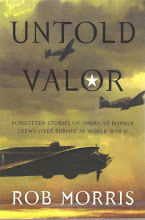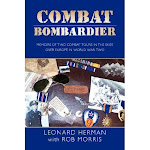 The passing of a great American and a tremendous human being.
The passing of a great American and a tremendous human being.New York Times Obituary, April 2007
Robert Rosenthal, Leader in Bombing Raids and Lawyer at Nuremberg, Dies at 89
By DOUGLAS MARTIN
Published: April 29, 2007
Robert Rosenthal, a highly decorated pilot in World War II who helped usher in a new kind of warfare, the strategic bombing of Germany, in which huge bombers scraped the ice-cold stratosphere while serving as easy targets for enemy fighters and ground guns, died on April 20 in White Plains. He was 89.
The cause was multiple myeloma, his son Steven said. Mr. Rosenthal lived in Harrison, N.Y.
He flew 52 missions over Germany as a bomber pilot, twice survived being shot down and won 16 decorations, including the Distinguished Service Cross for “extraordinary heroism.”
On one mission, his B-17 Flying Fortress was the only one in his group of 13 to return. On another, he was shot down and broke his right arm and nose. The next time he was shot down, he broke the same arm.
On Feb. 3, 1945, Rosie, as he was known, led the entire Third Division, an armada of 1,000 B-17s, on a raid on Berlin. He was later an assistant to the United States prosecutor in the Nuremberg trials, Robert H. Jackson.
Mr. Rosenthal served in the Eighth Air Force, the bomber command created a month after Pearl Harbor to bring Germany’s war machine to a halt through high-altitude strategic bombing. The idea was that long-range, fast-moving bombers could fly unescorted into enemy territory and rain down destruction with impunity.
But there were too few support planes, among other unforeseen difficulties, and the bombers proved to be a fat target for more numerous German fighters and antiaircraft guns. Casualties were enormous; only submarine crews in the Pacific had a higher fatality rate.
Mr. Rosenthal, a 25-year-old newly minted lawyer, had sought out the challenge. He enlisted the day after Pearl Harbor, and, when offered noncombat duties, insisted that he be sent to fight.
“I couldn’t wait to get over there,” he said in an interview with Donald L. Miller for the book “Masters of the Air: America’s Bomber Boys Who Fought the Air War Against Nazi Germany” (2006).
“When I finally arrived, I thought I was at the center of the world, the place where the democracies were gathering to defeat the Nazis,” he continued. “I was right where I wanted to be.”
Robert Rosenthal was born in Brooklyn on June 11, 1917, and went to school in the borough’s Flatbush neighborhood. He was captain of the football and baseball teams at Brooklyn College, from which he graduated in 1938. He graduated summa cum laude from Brooklyn Law School. He had a job at a law firm in Manhattan when World War II started.
After his flight training, Mr. Rosenthal was assigned to the Eighth Air Force’s 100th Bomb Group, later known as “The Bloody Hundredth.” He was stationed at a base in East Anglia in England.
Mr. Miller wrote that Mr. Rosenthal never talked about his passion to risk everything to fight Nazis. A rumor arose that he had relatives in German concentration camps. When asked directly, he replied, “That was a lot of hooey.”
He said: “I have no personal reasons. Everything I’ve done or hope to do is because I hate persecution. A human being has to look out for other human beings or there’s no civilization.”
His third mission was to bomb Münster on Oct. 10, 1943. After the American support fighters reached their range and returned home, the 13 bombers in the group were attacked by some 200 German fighters. The skies were filled with flak and flames, creating “an aerial junkyard,” according to a gunner.
Mr. Rosenthal’s plane dropped its bombs, but had two engines out, a gaping hole in one wing and three injured gunners. He put the 30-ton bomber through a harrowing series of evasive maneuvers and somehow made it back to England. None of the other 12 planes did.
In September 1944, Mr. Rosenthal’s plane was hit by flak over France and he made a forced landing, dulling his consciousness as well as breaking his arm and nose. He did not remember how, but the French resistance got him back to England.
On a February 1945 mission to bomb Berlin, he was shot down and rescued by Russians on the outskirts of the city. He was sent back to England on a circuitous route that wound through Poland, Moscow, Kiev, Tehran, Cairo, Greece and Naples.
That turned out to be his last mission, as the European war soon ended. He volunteered to fight in the Pacific, and was training to fly B-29s in Florida when Japan capitulated.
Mr. Rosenthal returned to his law firm, but seized the chance to join the team prosecuting Nazis in Nuremburg. On the ocean voyage to Germany, he met another lawyer on the prosecutorial staff, Phillis Heller, whom he married in Nuremberg.
In addition to her, he is survived by his sons Steven, of Newton, Mass., and Dan, of White Plains; his daughter, Peggy Rosenthal, of Manhattan; four grandchildren and two great-granddaughters.
As part of his duties during the trials, Mr. Rosenthal interviewed Hermann Goering, commander of the German air force and the second-highest-ranked Nazi during most of the war, and Wilhelm Keitel, the top German general.
“Seeing these strutting conquerors after they were sentenced — powerless, pathetic and preparing for the hangman — was the closure I needed,” he said. “Justice had overtaken evil. My war was over.”
Mr. Rosenthal always wondered about the unexploded cannon shell found rolling around in one of his plane’s tanks after the Münster raid. Had a slave laborer in a Nazi munitions factory sabotaged the shell?
By DOUGLAS MARTIN
Published: April 29, 2007
Robert Rosenthal, a highly decorated pilot in World War II who helped usher in a new kind of warfare, the strategic bombing of Germany, in which huge bombers scraped the ice-cold stratosphere while serving as easy targets for enemy fighters and ground guns, died on April 20 in White Plains. He was 89.
The cause was multiple myeloma, his son Steven said. Mr. Rosenthal lived in Harrison, N.Y.
He flew 52 missions over Germany as a bomber pilot, twice survived being shot down and won 16 decorations, including the Distinguished Service Cross for “extraordinary heroism.”
On one mission, his B-17 Flying Fortress was the only one in his group of 13 to return. On another, he was shot down and broke his right arm and nose. The next time he was shot down, he broke the same arm.
On Feb. 3, 1945, Rosie, as he was known, led the entire Third Division, an armada of 1,000 B-17s, on a raid on Berlin. He was later an assistant to the United States prosecutor in the Nuremberg trials, Robert H. Jackson.
Mr. Rosenthal served in the Eighth Air Force, the bomber command created a month after Pearl Harbor to bring Germany’s war machine to a halt through high-altitude strategic bombing. The idea was that long-range, fast-moving bombers could fly unescorted into enemy territory and rain down destruction with impunity.
But there were too few support planes, among other unforeseen difficulties, and the bombers proved to be a fat target for more numerous German fighters and antiaircraft guns. Casualties were enormous; only submarine crews in the Pacific had a higher fatality rate.
Mr. Rosenthal, a 25-year-old newly minted lawyer, had sought out the challenge. He enlisted the day after Pearl Harbor, and, when offered noncombat duties, insisted that he be sent to fight.
“I couldn’t wait to get over there,” he said in an interview with Donald L. Miller for the book “Masters of the Air: America’s Bomber Boys Who Fought the Air War Against Nazi Germany” (2006).
“When I finally arrived, I thought I was at the center of the world, the place where the democracies were gathering to defeat the Nazis,” he continued. “I was right where I wanted to be.”
Robert Rosenthal was born in Brooklyn on June 11, 1917, and went to school in the borough’s Flatbush neighborhood. He was captain of the football and baseball teams at Brooklyn College, from which he graduated in 1938. He graduated summa cum laude from Brooklyn Law School. He had a job at a law firm in Manhattan when World War II started.
After his flight training, Mr. Rosenthal was assigned to the Eighth Air Force’s 100th Bomb Group, later known as “The Bloody Hundredth.” He was stationed at a base in East Anglia in England.
Mr. Miller wrote that Mr. Rosenthal never talked about his passion to risk everything to fight Nazis. A rumor arose that he had relatives in German concentration camps. When asked directly, he replied, “That was a lot of hooey.”
He said: “I have no personal reasons. Everything I’ve done or hope to do is because I hate persecution. A human being has to look out for other human beings or there’s no civilization.”
His third mission was to bomb Münster on Oct. 10, 1943. After the American support fighters reached their range and returned home, the 13 bombers in the group were attacked by some 200 German fighters. The skies were filled with flak and flames, creating “an aerial junkyard,” according to a gunner.
Mr. Rosenthal’s plane dropped its bombs, but had two engines out, a gaping hole in one wing and three injured gunners. He put the 30-ton bomber through a harrowing series of evasive maneuvers and somehow made it back to England. None of the other 12 planes did.
In September 1944, Mr. Rosenthal’s plane was hit by flak over France and he made a forced landing, dulling his consciousness as well as breaking his arm and nose. He did not remember how, but the French resistance got him back to England.
On a February 1945 mission to bomb Berlin, he was shot down and rescued by Russians on the outskirts of the city. He was sent back to England on a circuitous route that wound through Poland, Moscow, Kiev, Tehran, Cairo, Greece and Naples.
That turned out to be his last mission, as the European war soon ended. He volunteered to fight in the Pacific, and was training to fly B-29s in Florida when Japan capitulated.
Mr. Rosenthal returned to his law firm, but seized the chance to join the team prosecuting Nazis in Nuremburg. On the ocean voyage to Germany, he met another lawyer on the prosecutorial staff, Phillis Heller, whom he married in Nuremberg.
In addition to her, he is survived by his sons Steven, of Newton, Mass., and Dan, of White Plains; his daughter, Peggy Rosenthal, of Manhattan; four grandchildren and two great-granddaughters.
As part of his duties during the trials, Mr. Rosenthal interviewed Hermann Goering, commander of the German air force and the second-highest-ranked Nazi during most of the war, and Wilhelm Keitel, the top German general.
“Seeing these strutting conquerors after they were sentenced — powerless, pathetic and preparing for the hangman — was the closure I needed,” he said. “Justice had overtaken evil. My war was over.”
Mr. Rosenthal always wondered about the unexploded cannon shell found rolling around in one of his plane’s tanks after the Münster raid. Had a slave laborer in a Nazi munitions factory sabotaged the shell?

The Gil Cohen painting of Rosie (Center) and his 'Riveters', at Thorpe Abbotts Airfield, 100th BG, 1943.







No comments:
Post a Comment